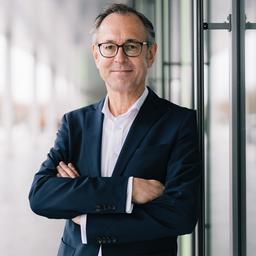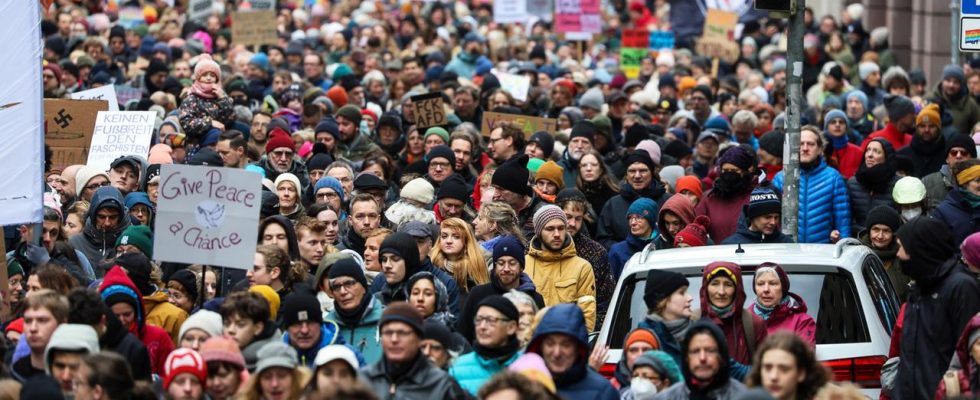Around two million people took part in the protests against right-wing extremism over the last three weekends alone. But what can the mass demonstrations achieve? tagesschau.de interviewed experts.
The demonstrations against right-wing extremism continue to be very popular. Over the past three weekends, there were a total of around 1.98 million participants in demonstrations for democracy and against right-wing extremism. This was announced by the Federal Ministry of the Interior, citing police information tagesschau.de with. The numbers of demonstrations during the week, such as the 180,000 participants on January 19th in Hamburg, are not yet included.
But what can these mass demonstrations achieve? And what follows from that? tagesschau.de asked the political scientist Ursula Münch, the protest researcher Dieter Rucht, the historian Hedwig Richter and the extremism researcher Andreas Zick and recorded their answers.
Ursula Münch: “Community spirit comes into play in public”
“It is fundamentally positive when people take to the streets for democracy. The so-called silent majority does not stay at home, but shows up. This makes sense because it belies the claims of extremists and populists who are for claim to represent ‘the people.’ But the populists and extremists don’t do that: they simply speak for a loud minority and incite them further.
Another positive aspect of the demonstrations is the visible solidarity with the people who themselves or whose families have immigrated to the Federal Republic. Here a public spirit comes into play and the distance to the exclusionary intentions of the AfD, for example.
It would be problematic if the serious parties then ‘lean back’ according to the motto: Citizens get involved, that’s enough. In doing so, they would absolve themselves from the obligation to ask themselves about their own failures and to consider what part they each played in the AfD being able to record such a surge in popularity.
Another problem could arise from the fact that demonstrations are not places for balanced discourse; This means that as a result of the mobilization, which is primarily directed against the AfD, two groups may find themselves even more irreconcilable than they already are.
It would be desirable if many people not only took part in demonstrations, but also got involved in parties again. Or in unions and other associations. These are places where differentiation can be made. And democracy thrives on such commitment.
At a demonstration A few days ago in Upper Bavaria I also pointed out how important it is to understand that our liberal democracy is based on a public opinion-forming process that is free from (digital) manipulation. The vulnerability of liberal democracy is great here.
It would therefore also be desirable for the participants to use the demonstrations as an opportunity to seek contact with those who have lost trust in the media as well as in the serious parties and in our democracy’s ability to solve problems. After all, these are not just conspiracy believers, but also our acquaintances, relatives, colleagues and neighbors.”
Ursula Münch
Ursula Münch has been director of the Academy for Political Education in Tutzing since 2011. She deals a lot with social division and polarization. Previously, she was Professor of Political Science and Dean of the Faculty of Political and Social Sciences at the University of the Federal Armed Forces in Munich.
Dieter Rucht: “The fronts are probably hardening”
“One already noticeable effect of these demonstrations is that they strengthen the self-confidence of those involved: ‘We have a common goal. We are democrats. And there are many of us.’
One can only speculate about further effects. The fronts are probably hardening. In view of the headwind, some on the right will probably say: ‘Now more than ever.’ These people feel like victims of a campaign orchestrated ‘from above’. They will move even closer together.
This in turn means that counter-reactions from the democratic camp can be expected. The political dispute is causing previously indifferent groups, particularly from the ‘middle’ of society, to take a position. The bottom line is that this should lead to a strengthening of democracy.
As a political citizen, I hope that the current demonstrations are not a flash in the pan. Even if this wave of protests will subside again, upcoming elections and continued provocations from right-wing extremists will provide new opportunities for pro-democratic protest.
I expect that some of the political energy that has now become visible will be consolidated in groups and organizations of political civil society. And I expect those involved to aggressively represent their stance on right-wing extremism on specific occasions in their everyday lives – at work, in sports clubs, in the pub. That’s why there’s the nice term “civil courage.”

To person
Dieter Rucht is a sociologist. Until his retirement in June 2011, the protest frog was co-head of the research group on civil society, citizenship and political mobilization in Europe at the Berlin Science Center.
Hedwig Richter: “A feeling of Togetherness”
“The demonstrations are a celebration. People celebrate democracy. That’s what those who are there report. And that’s how the demonstrations strengthen democracy. They communicate that democracy and its values are important to people.
First and foremost, these values include human dignity, which, in Article 1 of the Basic Law, forms the core of the German understanding of democracy and the state. This is clear on the signs, but also in many speeches – unfortunately not all of them, some express demeanor towards conservative democratic positions.
The demonstrations create a feeling of togetherness and solidarity. Democracy has a lot more to do with feelings than is often realized. It lives from trust, solidarity, compassion.
The fundamental assumption that all people are equal cannot only be thought of in the abstract; it must also be felt. The demonstrations show this equality through the egalitarian participation of hundreds of thousands of people from different backgrounds – and through the message of human dignity.
For the population, the result could be to transfer the commitment to democracy from these demonstration festivals into everyday life: joining parties, standing in the marketplace in elections, possibly campaigning door-to-door for democratic parties. Politicians should at least consider one of the loudest demands of the demonstrators: a ban on the AfD, which the demonstrations are essentially about combating.
The press and the public as a whole could cultivate more democratic communication: avoid insinuations, unforgiveness and hatred within the democratic spectrum as much as possible – and beware of even flirting with fake news. Even criticism of political opponents should show respect.”

To person
Hedwig Richter is a historian. She is a professor of modern and contemporary history at the University of the Federal Armed Forces in Munich. Her research interests include democracy and dictatorship research.
Andreas Zick: “Sustainable strengthening of the civil society”
“In my opinion, the demonstrations have already made a difference for democracy. A democracy needs a stable and influential civil society that is committed to a defensive democracy and shows up from time to time so that it is clear to politicians and others where the limits of tolerance are Extremism, hatred and violence lie. This was shown in the demonstrations and found a place for understanding.
For years, right-wing radical demonstrations have dominated the spaces. Many groups that are now united to create their own demonstration only appeared as counter-demonstrations.
The demonstrations have also brought new public attention to the issue of right-wing extremism as well as democracy and the protection of immigrants. The topic has been in the public space for weeks, being discussed and in some cases the quietly creeping acceptance of right-wing populist and right-wing extremist themes has been broken.
Thanks to a lot of media research and reports from civil society groups, the right-wing radical structures are becoming more visible and are less difficult to conceal from right-wing populist and right-wing extremist groups.
A culture of remembrance is also being reactivated. Many signs say ‘Never again’ and what they mean is a fascist system that seeks to destroy people.
Research on memory culture shows that more and more memories are being lost, that rituals are becoming hollow, and that young people can hardly remember. This is now made clear by the demonstrations and they emphasize how relevant this culture is.
A central consequence of the demonstrations is the sustainable strengthening of civil society and democracy projects. This is an opportunity for politicians, cities, municipalities and districts to finally strengthen and create sustainable civil society structures. It should not be forgotten that in many social areas funding is currently either stagnating or being reduced. Democracies need strong civil societies in times of crisis.
In addition, many other consequences arise from the question of how it got to this point: Can society continue to be blind to the normalization of the shift in norms and values? Is it guided by its own ideas about the future of a democratic society or by right-wing populist Germanism? How much and what education is necessary and when to become a democrat? Is the Basic Law adequately protected? Some of these questions are currently being addressed with a level of intensity that we have not seen in a long time.”

To person
Andreas Zick is director of the Institute for Interdisciplinary Conflict and Violence Research (IKG) at Bielefeld University. His research focuses on intra-societal conflicts and processes of radicalization
Protocol: Konstantin Kumpfmüller, tagesschau.de

